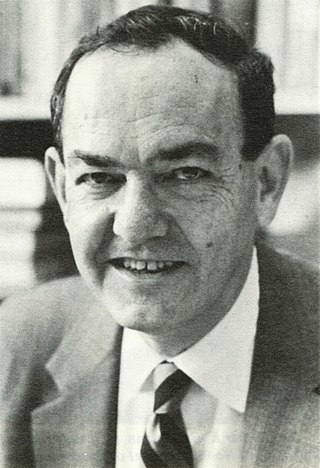Related Research Articles

Herbert Alexander Simon was an American political scientist whose work also influenced the fields of computer science, economics, and cognitive psychology. His primary research interest was decision-making within organizations and he is best known for the theories of "bounded rationality" and "satisficing". He received the Nobel Memorial Prize in Economic Sciences in 1978 and the Turing Award in computer science in 1975. His research was noted for its interdisciplinary nature, spanning the fields of cognitive science, computer science, public administration, management, and political science. He was at Carnegie Mellon University for most of his career, from 1949 to 2001, where he helped found the Carnegie Mellon School of Computer Science, one of the first such departments in the world.

Carnegie Mellon University (CMU) is a private research university in Pittsburgh, Pennsylvania. The institution was established in 1900 by Andrew Carnegie as the Carnegie Technical Schools. In 1912, it became the Carnegie Institute of Technology and began granting four-year degrees. In 1967, it became Carnegie Mellon University through its merger with the Mellon Institute of Industrial Research, founded in 1913 by Andrew Mellon and Richard B. Mellon and formerly a part of the University of Pittsburgh.

The Heinz College of Information Systems and Public Policy, also known as Heinz College, is the public policy and information college of Carnegie Mellon University in Pittsburgh, Pennsylvania. It consists of the School of Information Systems and Management and the School of Public Policy and Management. The college is named after CMU's former instructor and the later U.S. Senator John Heinz from Pennsylvania.

John Patrick "Pat" Crecine was an American educator and economist who served as President of Georgia Tech, Dean at Carnegie Mellon University, business executive, and professor. After receiving his early education at public schools in Lansing, Michigan, he earned a bachelor's degree in industrial management, and master's and doctoral degrees in industrial administration from the Graduate School of Industrial Administration at Carnegie Mellon University. He also spent a year at the Stanford University School of Business.

Edward Christian Prescott was an American economist. He received the Nobel Memorial Prize in Economics in 2004, sharing the award with Finn E. Kydland, "for their contributions to dynamic macroeconomics: the time consistency of economic policy and the driving forces behind business cycles". This research was primarily conducted while both Kydland and Prescott were affiliated with the Graduate School of Industrial Administration at Carnegie Mellon University. According to the IDEAS/RePEc rankings, he was the 19th most widely cited economist in the world in 2013. In August 2014, Prescott was appointed an Adjunct Distinguished Economic Professor at the Australian National University (ANU) in Canberra, Australia. Prescott died of cancer on November 6, 2022, at the age of 81.
The Marianna Brown Dietrich College of Humanities and Social Sciences is the liberal and professional studies college and the second-largest academic unit by enrollment at Carnegie Mellon University in Pittsburgh, Pennsylvania, USA. The college emphasizes study through rigorous analysis and technology of the behaviors, institutions, and beliefs that constitute the human experience, describing itself as “not an ordinary liberal arts school.” The college was named for Marianna Brown Dietrich, the mother of philanthropist William S. Dietrich II, after his donation of $265 million to the university in 2011 – the largest single donation in Carnegie Mellon history.
The Department of Social and Decision Sciences (SDS) is an interdisciplinary academic department within the Dietrich College of Humanities and Social Sciences at Carnegie Mellon University. The Department of Social and Decision Sciences is headquartered in Porter Hall in Pittsburgh, Pennsylvania and is led by Department Head Gretchen Chapman. SDS has a world-class reputation for research and education programs in decision-making in public policy, economics, management, and the behavioral social sciences.

George Loewenstein is an American educator and economist. He is the Herbert A. Simon Professor of Economics and Psychology in the Social and Decision Sciences Department at Carnegie Mellon University and director of the Center for Behavioral Decision Research. He is a leader in the fields of behavioral economics, neuroeconomics, Judgment and Decision Making.
Robert C. Wilburn is the director of Carnegie Mellon University Heinz College's Washington, DC campus as well as a Distinguished Service Professor at the college. Prior to this position he was the first president and Chief Executive Officer of the Gettysburg Foundation. He served as president and CEO of the Carnegie Institute in Pittsburgh and as president of Colonial Williamsburg Foundation. Under his leadership, the number of customers, members, donors, and volunteers increased sharply within each organization. The merger of the Buhl Science Center with the Carnegie Institute and the construction of a new $40 million Kamin Science Center are among his notable accomplishments. While at the Carnegie Institute, Wilburn also contributed to the founding of the Andy Warhol Museum by negotiating gifts of more than a thousand paintings and drawings from the Warhol and DIA Foundations and by raising funds to secure and renovate a historic, seven-story building in downtown Pittsburgh. The Warhol Museum is probably the largest museum in the world dedicated to a single artist and may have been the largest gift ever given to a museum at one time, in value.
Mark Wessel was the Dean of the H. John Heinz III College at Carnegie Mellon University from 2004 to 2008. Prior to becoming Dean, Wessel held leadership positions within the Heinz College as Acting Dean, Chief Operating Officer, Senior Associate Dean, and Associate Dean as well overseeing a number of Masters programs. He is currently a lecturer in Economics and Public Policy.
Jennifer S. Lerner is an American experimental social psychologist known for her research in emotion and decision theory. She is the first psychologist at the Harvard Kennedy School to receive tenure. At Harvard, her titles include Professor of Public Policy and Management, Professor of Psychology, Faculty Director in the Graduate Commons Program, co-founder of the Harvard Decision Science Laboratory and co-director of the Harvard Faculty Group on Emotion, Decision Making, and Health. Her research interests include the effects of accountability on judgment and choice. She founded and directs the Leadership Decision Making program within Harvard Kennedy School's executive education program.
Max Hal Bazerman is an author and researcher whose work focuses on negotiation, behavioral economics, and ethics.
The Tepper School of Business is the business school of Carnegie Mellon University. It is located in the university's 140-acre (0.57 km2) campus in Pittsburgh, Pennsylvania.
Denise Rousseau is a professor at Carnegie Mellon University. She holds an H.J. Heinz III Chair in Organizational Behavior and Public Policy, Heinz College and jointly Tepper School of Business.

Kathleen M. Carley is an American computational social scientist specializing in dynamic network analysis. She is a professor in the School of Computer Science in the Carnegie Mellon Institute for Software Research at Carnegie Mellon University and also holds appointments in the Tepper School of Business, the Heinz College, the Department of Engineering and Public Policy, and the Department of Social and Decision Sciences.
Ramayya Krishnan is an Indian American Management and Information technology scholar from Pittsburgh, Pennsylvania. He is the dean of Heinz College, and is the W. W. Cooper and Ruth F. Cooper Professor of Management science and Information systems at Carnegie Mellon University. Krishnan is also a past president of the Institute for Operations Research and Management Science (INFORMS).

Kiron Kanina Skinner is a former Director of Policy Planning at the United States Department of State in the Trump administration. Skinner is presently the Taube Professor of International Relations and Politics at the Pepperdine University School of Public Policy, where she teaches graduate courses in national security and public leadership. Prior to that, she was the Taube Professor of International Relations and Politics at Carnegie Mellon University, and the founding director of the Institute for Politics and Strategy and associated centers at the university. She is also the W. Glenn Campbell Research Fellow at the Hoover Institution. After leaving the Department of State, she returned to her position at Carnegie Mellon University until stepping down in 2021.
Terry Babcock-Lumish is an American professor, entrepreneur, and policymaker. She is the Executive Secretary of the Harry S. Truman Scholarship Foundation.
Rachel Toni Algaze Croson is an economist currently serving as Executive Vice President and Provost of the University of Minnesota, and McKnight Endowed Professor of Economics. Until March 2020, she served as Dean of the College of Social Science and MSU Foundation Professor of Economics at Michigan State University. She earned her bachelor's degree in economics and the philosophy of science from the University of Pennsylvania and her master's and Ph.D. in economics from Harvard University.
Linda Argote is an American academic specializing in industrial and organizational psychology. She is Thomas Lord Professor of Organizational Behavior and Theory in the Tepper School of Business at Carnegie Mellon University, where she directs the Center of Organizational Learning, Innovation and Knowledge.
References
- 1 2 "LINDA C. BABCOCK". Heinz College. Carnegie Mellon University. Retrieved January 16, 2018.
- ↑ "Linda C. Babcock | Behavioral Science & Policy Association". behavioralpolicy.org. Retrieved 2021-03-07.
- ↑ University, Carnegie Mellon. "Linda Babcock - Social and Decision Sciences - Dietrich College of Humanities and Social Sciences - Carnegie Mellon University". www.cmu.edu. Retrieved 2021-03-07.
- ↑ Slavina, Vicki (June 17, 2013). "Why Women Must Ask (The Right Way): Negotiation Advice From Stanford's Margaret A. Neale". Forbes. Retrieved January 26, 2018.